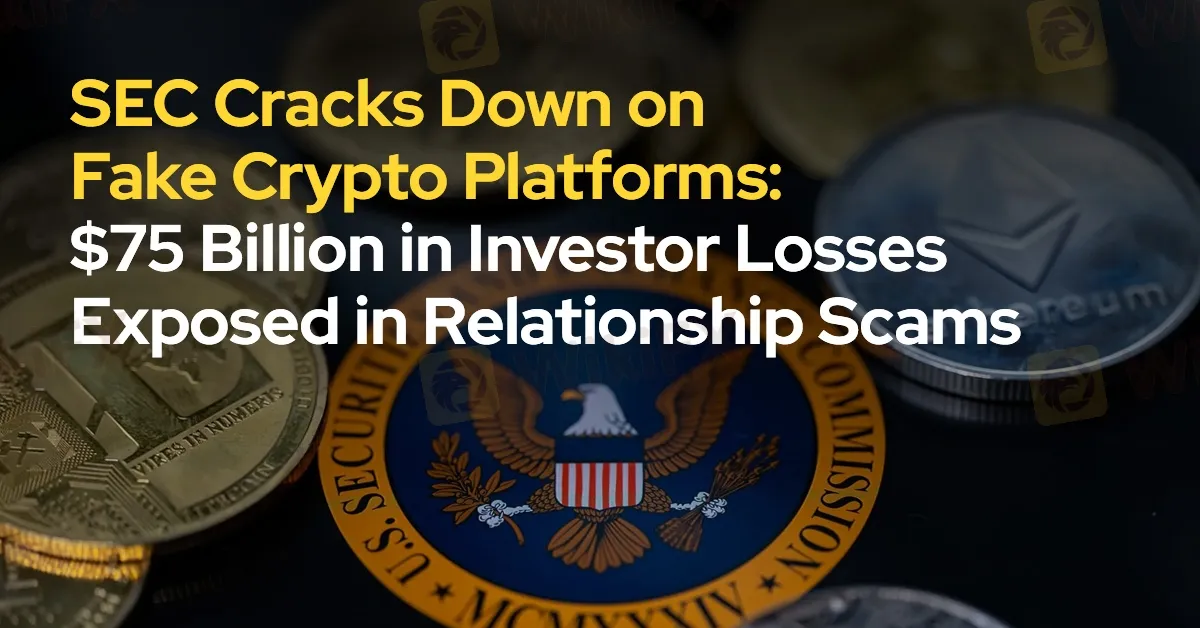简体中文
繁體中文
English
Pусский
日本語
ภาษาไทย
Tiếng Việt
Bahasa Indonesia
Español
हिन्दी
Filippiiniläinen
Français
Deutsch
Português
Türkçe
한국어
العربية
SEC Cracks Down on Fake Crypto Platforms: $75Billion in Investor Losses Exposed in Relationship Scam
abstrak:The U.S. Securities and Exchange Commission (SEC) has taken significant action against two allegedly fraudulent cryptocurrency platforms, NanoBit and CoinW6. These platforms are accused of deceiving investors and siphoning off their money in elaborate schemes

The U.S. Securities and Exchange Commission (SEC) has taken significant action against two allegedly fraudulent cryptocurrency platforms, NanoBit and CoinW6. These platforms are accused of deceiving investors and siphoning off their money in elaborate schemes. This marks the SECs first case targeting this specific type of scam, shedding light on the increasing threat posed by such operations in the cryptocurrency space.
The SEC filed two formal complaints in U.S. District Courts for the Eastern District of New York and the Central District of California, implicating five entities and three individuals. According to the complaints, the fraudulent platforms lured investors through popular social media channels such as WhatsApp, LinkedIn, and Instagram, using tactics described as “relationship investment scams.” These scams are characterized by cultivating trust with victims through personal connections, only to later exploit that trust for financial gain.
The SEC has raised alarm over the growing prevalence of these scams, particularly in the crypto sector. Gurbir S. Grewal, director of the SECs Division of Enforcement, highlighted the increasing danger these scams pose, noting that relationship-based investment frauds involving crypto assets have the potential for catastrophic harm to retail investors. This danger is becoming more prominent as fraudsters increasingly target unsuspecting individuals through such schemes.

Often referred to as “pig butchering” or romance scams, these tactics are becoming a pervasive issue in the cryptocurrency industry. Reports suggest that these schemes have resulted in victim losses estimated at approximately $75 billion between 2020 and early 2024. These figures underscore the severe impact such fraudulent activities have on investors, making them a major point of concern for regulatory agencies.
In response to this growing threat, the Commodity Futures Trading Commission (CFTC) has announced that it is working closely with the SEC, along with other federal and state regulators, to tackle the rising number of crypto-related scams. The collaboration aims to address the expanding risk posed by such deceptive practices.
According to the SECs complaint, individuals associated with NanoBit allegedly posed as financial professionals in WhatsApp groups between October 2023 and June 2024. They encouraged customers to invest through the fraudulent platform, NanoBit, which falsely claimed to be affiliated with an SEC-registered broker, NanobitUS Securities. Investors were duped into participating in fake initial coin offerings, which were presented as highly lucrative. Instead, their funds were funnelled to scheme participants, who transferred over $2 million through various bank accounts to Hong Kong.
CoinW6 employed a similarly deceitful approach. Participants posed as wealthy young professionals on platforms like LinkedIn and Instagram, initiating romantic relationships with victims through WhatsApp. They promised daily returns of up to 3% from staking, mining, and other crypto-related products. However, the SEC alleges that these promises were entirely fabricated, and victims funds were stolen.
When investors attempted to withdraw their funds, fraudsters demanded additional payments, citing taxes or fees, or claimed that the assets were frozen as part of a law enforcement investigation. In some cases, they even resorted to blackmail using compromising romantic communications.
These cases serve as a stark reminder of the risks lurking in the cryptocurrency world and highlight the importance of regulatory vigilance in protecting retail investors from evolving scams.

Disclaimer:
Ang mga pananaw sa artikulong ito ay kumakatawan lamang sa mga personal na pananaw ng may-akda at hindi bumubuo ng payo sa pamumuhunan para sa platform na ito. Ang platform na ito ay hindi ginagarantiyahan ang kawastuhan, pagkakumpleto at pagiging maagap na impormasyon ng artikulo, o mananagot din para sa anumang pagkawala na sanhi ng paggamit o pag-asa ng impormasyon ng artikulo.
Broker ng WikiFX
Exchange Rate


